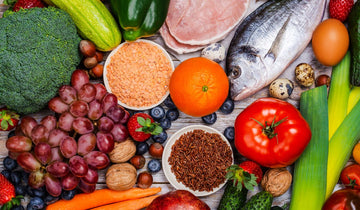Everything you should know about the paleo or paleolithic diet
for Baia Food en Feb 22, 2017
Tabla de contenidos
The Paleo or Paleolithic diet is based on the dietary principles followed by our ancestors in the Stone Age, when they survived on what they hunted or gathered in the naturalness, without agriculture or livestock.
It basically consists of excluding dairy products, legumes, grains, processed oils, and refined sugars, and focusing on vegetables, meats, eggs, fish, roots, fruits, as well as nuts, seeds, and plenty of water (oh, and very limited alcohol).
One of the foundations of this diet is that the human genome has changed very little since then and has not had time to adapt to the foods that have appeared over the last 10,000 years.
PROS
Exclude processed foods
Eliminate flour, sugar, processed pastries, ice cream, sweeteners, soft drinks, etc. Eliminating these products can be a very positive change for those who consume them daily, increasing energy levels and stabilizing blood sugar. Also, for those with lactose and gluten intolerance, digestion improves considerably by eliminating the "cause" of the problem.
Full of protein
There are no deficiencies in this macronutrient, as it is a fundamental part of the diet. All essential amino acids are supplied, and muscle mass is not lost.
Lots of fiber
By including a wide variety of vegetables, fruits, nuts and seeds you consume a lot of fiber, vitamins and minerals, thus avoiding bloating and constipation.
CONS
Limits of the agri-food industry
The animal protein our ancestors ate was wild, meaning they were animals that didn't eat feed made primarily from grains (but rather from grass and roots) and were always free-range. Unless you make sure to buy organic, grass-fed meat, organic eggs from free-range hens, wild fish (not farmed), etc., you'll be consuming pro-inflammatory fats, as they don't contain Omega 3s but instead contain an excess of Omega 6s.
Lack of fiber and certain nutrients
Completely eliminating foods like lentils, chickpeas, brown rice, oats, amaranth, quinoa, etc.—rich in vegetable protein, alkalizing minerals like iron, phosphorus, potassium, and B vitamins—and replacing them with animal protein (not always of the best quality and highly acidifying) isn't always a good idea. These foods have been consumed for thousands of years and are part of the daily diet of long-lived peoples (the Japanese, for example), so the paleo diet seems questionable.
Extreme posture
Our genome has demonstrated a remarkable capacity to adapt to all types of diets (visible in the diversity of foods eaten in different parts of the world), and how we tolerate certain foods depends on our individual genome. Some people have no problem digesting chickpeas and others don't tolerate red meat well, for example, and vice versa. Many people follow a vegetarian diet rich in legumes and whole grains and enjoy excellent health. It's all a matter of balance and seeing what suits you best.





